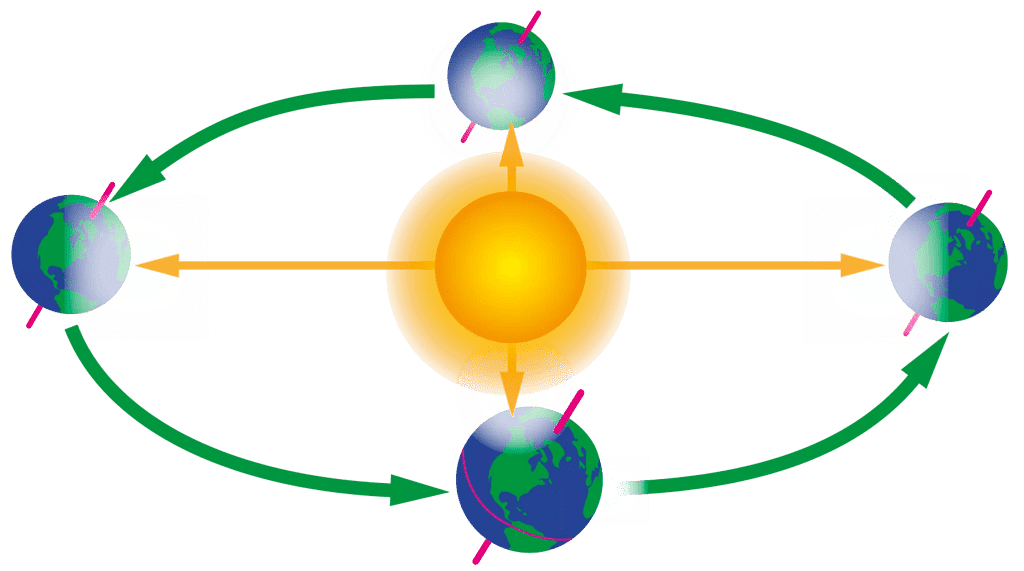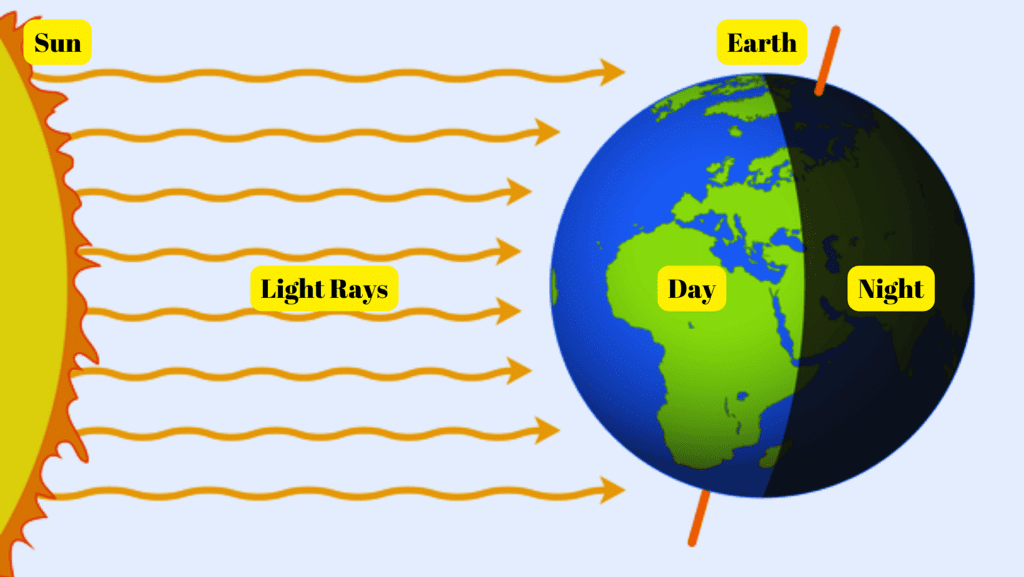The Earth - CBSE Worksheets Solutions
Q1: Multiple Choice Questions (MCQs)
(i) The revolution of the earth causes :
(a) changes in seasons
(b) day and night
(c) planets to grow
(d) none of these
Ans: Option A
Earth has seasons because of revolution of earth and its axis is tilted. Earth's axis is always pointed in the same direction, so different parts of Earth get the Sun's direct rays throughout the year. For example, in summer, the Sun's rays hit that region more directly than at any other time of the year.
 Earth's revolution causes changes in seasons(ii) The earth completes one revolution around the sun in about :
Earth's revolution causes changes in seasons(ii) The earth completes one revolution around the sun in about :
(a) 365 1/4 days
(b) 370 days
(c) 385 days
(d) 350 1/4 days
Ans: Option A
The Earth completes one orbital revolution around the Sun in 365 days 5 hrs.
(iii) The rotation of the earth causes :
(a) changes in seasons
(b) day and night
(c) planets to grow
(d) none of these
Ans: Option B
Day and night are due to the earth rotating on its axis.
 Earth's Rotation
Earth's Rotation
(iv) Time taken by the earth to complete one rotation is :
(a) 12 hours
(b) 36 hours
(c) 24 hours
(d) 48 hours
Ans: Option C
Earth completes its rotation about its own axis in 24 hour.
(v) The actual shape of the earth is :
(a) square
(b) spherical
(c) conical
(d) triangular
Ans: Option B
The Shape of the Earth is spherical. Because the Earth is a sphere, the surface gets much more intense sunlight (heat) at the equator than at the poles.
Q2: Fill in the blanks with the given words:
seasons, rotation, spherical, earth, sun
(a) The earth is spherical in shape.
(b) Day and night are caused by the rotation of the earth on its axis.
(c) Earth is the only known planet which supports life.
(d) The revolution of the earth causes the changes in Seasons.
(e) The earth takes about 365 1/4 days to revolve around the Sun.
EduRev Tips:
- The Shape of the Earth is Spherical. Because the Earth is a sphere, the surface gets much more intense sunlight (heat) at the equator than at the poles.
- Day and night are due to the Earth rotating on its axis, not its orbiting around the sun.
- Our solar system has eight planets revolving around the sun along with other dwarf planets and celestial bodies. Of all the known planets only the planet earth supports life.
- Earth has seasons because its axis is tilted. Earth's axis is always pointed in the same direction, so different parts of Earth get the Sun's direct rays throughout the year.
- At the same time that the Earth spins on its axis, it also orbits, or revolves around the Sun. This movement is called revolution.
Answer the following questions.
Q3: What is the revolution of the earth
Ans: The movement of the Earth around the Sun in a fixed path is called a revolution. The Earth revolves from west to east i.e, in the anticlockwise direction. The Earth completes one revolution around the Sun in one year or precisely in 365(¼) days.
Q4: How are day and night formed on earth?
Ans: We get day and night because the Earth spins (or rotates) on an imaginary line called its axis and different parts of the planet are facing towards the Sun or away from it. It takes 24 hours for the world to turn all the way around, and we call this a day.
Q5: In how many days does the earth complete one revolution around the sun?
Ans: The earth takes about 365(¼) days to revolve around the Sun.
Q6: Give two evidences to show that the earth is spherical in shape.
Ans:
- Heavenly bodies appear to be spherical: The Sun, the Moon and other heavenly bodies appear to be spherical when viewed from different positions. The earth is one of them and hence it must also be spherical in shape.
- The Lunar Eclipse: The lunar eclipse proves that the Earth is in spherical shape. During lunar eclipse when the Earth is between the Sun and the Moon, the shadow of the Earth falls on the Moon.
- Horizon: When we see the horizon it's always bent.
Q7: Explain the movement of the earth. Ans: The two main movements of the Earth are rotation and revolution. Rotation refers to the spinning of the Earth on its axis, which takes 24 hours and results in day and night. Revolution refers to the movement of the Earth around the Sun on its orbit, taking 365¼ days to complete and causing the change in seasons.
Ans: The two main movements of the Earth are rotation and revolution. Rotation refers to the spinning of the Earth on its axis, which takes 24 hours and results in day and night. Revolution refers to the movement of the Earth around the Sun on its orbit, taking 365¼ days to complete and causing the change in seasons.
Q8: Why cannot we see the sun at night?
Ans: We cannot see the sun at night because since the earth constantly rotates on its axis, there's always one side that faces towards the sun which we call “daytime”, and the side that faces away from the sun is what we call “nighttime”. Day and Night
Day and Night
Q9: State True or False for the given statements.
(a) The rotation of the earth results in day and night. (True)
(b) The earth takes twelve hours to complete one rotation. (False)
(c) The path taken by the earth around the sun is called its orbit. (True)
(d) The spinning of the earth on its own axis is called revolution of the earth. (False)
EduRev Tips:
- Day and night are due to the Earth rotating on its axis, not its orbiting around the sun.
- The earth takes 24 hours to complete one rotation.
- Earth orbits, or revolves around the Sun. This movement is called revolution.
- The movement of the Earth around the Sun in a fixed path is called a revolution.
|
19 videos|48 docs|30 tests
|
FAQs on The Earth - CBSE Worksheets Solutions
| 1. What are some important facts about the Earth? |  |
| 2. How does the Earth's atmosphere help support life on the planet? |  |
| 3. What are some of the natural resources found on Earth? |  |
| 4. How does the Earth's rotation impact our daily lives? |  |
| 5. What are some ways we can help protect the Earth's environment? |  |

|
Explore Courses for Class 3 exam
|

|


















